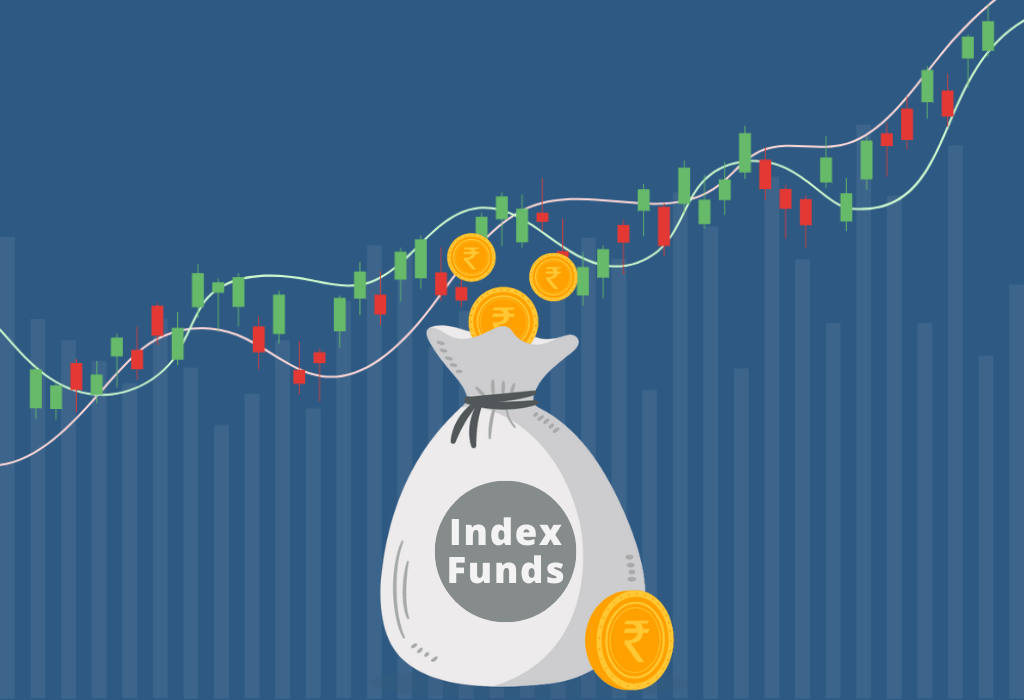Did you know that index funds account for almost 16 percent of the US stock market capitalization at the end of 2021, higher than actively managed funds, whose share is 14%?
Invest in Index funds in India – A decade ago, actively managed funds were ruling the roost. At the beginning of 2010, actively managed funds managed assets worth $2.25 trillion, compared to just $0.77 trillion in index funds. And the story in India is also not entirely different. Since Feb 2020, the asset under management (AUM) index funds in India has increased by over 590%, while the number of index funds more than doubled to 72.
So, why are Index Funds in India becoming popular over other equity funds, and what are they? Let’s understand.
What are Index Funds?
Index funds are a type of mutual funds or exchange-traded funds that invest in the stocks of a particular stock market index. Their stock portfolio mimics the composition and weightage of the stocks in that index. For example, Reliance Industries and HDFC Bank have a weightage of 12.94% and 8.55%, respectively, in the Nifty50 index. Therefore, any index fund that tracks the Nifty50 index will have to have stocks of Reliance Industries and HDFC Bank in that proportion only.
Index funds in India are not new in the market. John C Bogle, the founder of Vanguard, launched the first index fund in the world on 31st August 1976. Called the First Index Investment, it tracked the S&P500 index. Over the decades, index-based investing has become popular and attracted plenty of new and existing investors in the market.
What Makes Index Funds So Unique and Popular?
Simplicity is what makes index funds and index-based investing so unique and popular.
For instance, index-based investing is known for its passive investing style, meaning the fund manager or user doesn’t have to actively manage the fund. Instead, the fund manager must invest in stocks included in the index. It involves no other additional tasks like monitoring the performance of funds or researching new stocks.
Benefits of Index Funds in India
Moreover, investing in an index fund or index-based investing also fulfils other basic principles of investing, like
- Broader Diversification: An equity index fund helps achieve proper diversification in an investment portfolio by spreading the investment in multiple stocks across different sectors. It helps to minimize the risk of loss in investment, and no single stock can influence the fund’s performance.
- Investment in Quality Stocks: Different indexes have different criteria for stock inclusion. But most are based on market capitalization and liquidity in the stock. For example, Sensex includes the top 30 stocks based on market capitalization, the Bank Nifty index contains all the banking stocks, and their weightage in the index is based on market capitalization. Moreover, the stocks included in indices are well-established and have strong fundamentals.
- Low Cost: It is the most significant factor attracting investors from all spectrums of society. As funds are passively managed, there is no need for a complex investment strategy to generate returns. As a result, it lowers the fund management cost leading to a low expense ratio. As a result, the index fund’s expense ratio is lower by 150 to 200 bps than actively managed equity funds.
- Tax Benefits: Equity index funds in India are passively managed, which means the turnover is low. The number of trades placed is few, so capital gain distributions passed on to shareholders are fewer. Low gains mean lower taxes. Unless you exit the fund, taxes are based on how long you hold the fund.
Historical Performance of Equity Index Funds
A snapshot of average returns of large-cap equity mutual fund category and various index funds investing Nifty50 and BSE Sensex stocks.
| Fund Category | 1-year Return | 3-year Return | 5-year Return | 10-year Return |
| HDFC Index Fund Nifty 50 | 3.93 % | 12.64 % | 11.72 % | 12.57% |
| HDFC Index S&P BSE Sensex | 4.37 % | 12.71 % | 12.38 % | 12.86 % |
| UTI Nifty 50 Index Fund | 4.08 % | 12.91 % | 11.91 % | 12.61 % |
| SBI Nifty Index Fund | 3.83 % | 12.29 % | 11.31 % | 11.93 % |
The above table highlights hardly any significant differences in the returns of actively managed large-cap equity and index funds in India. As John C Bogle, father of passive investing, said, “the chances of equity fund managers consistently beating the market is little. Therefore, the risks taken by fund managers are unjustifiable.”
Should You Invest in Index Funds in India?
Index funds are simple and remarkably effective in wealth creation over the long term. But, whether to invest in index funds in India or not depends on your long-term investing goals and risk preferences.
One of the biggest advantages of index funds in India is that their performance is easy to track. You need to track the fund’s underlying index to know how your fund is performing.
Suppose you are a risk-averse investor and want to avoid the technicalities of investing in the market and bring simplicity to your investment journey. In that case, index funds will suit your investment portfolio.
Read more: How Long term investing helps create life-changing wealth – TOI
How useful was this post?
Click on a star to rate it!
Average rating 5 / 5. Vote count: 1
No votes so far! Be the first to rate this post.

